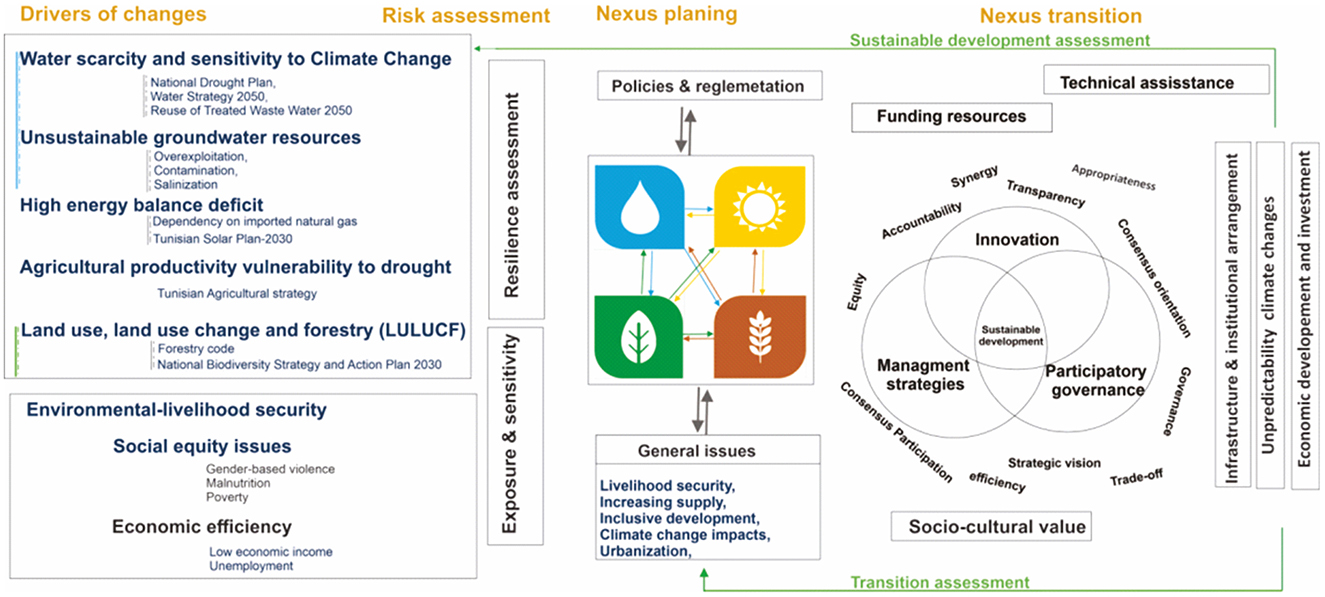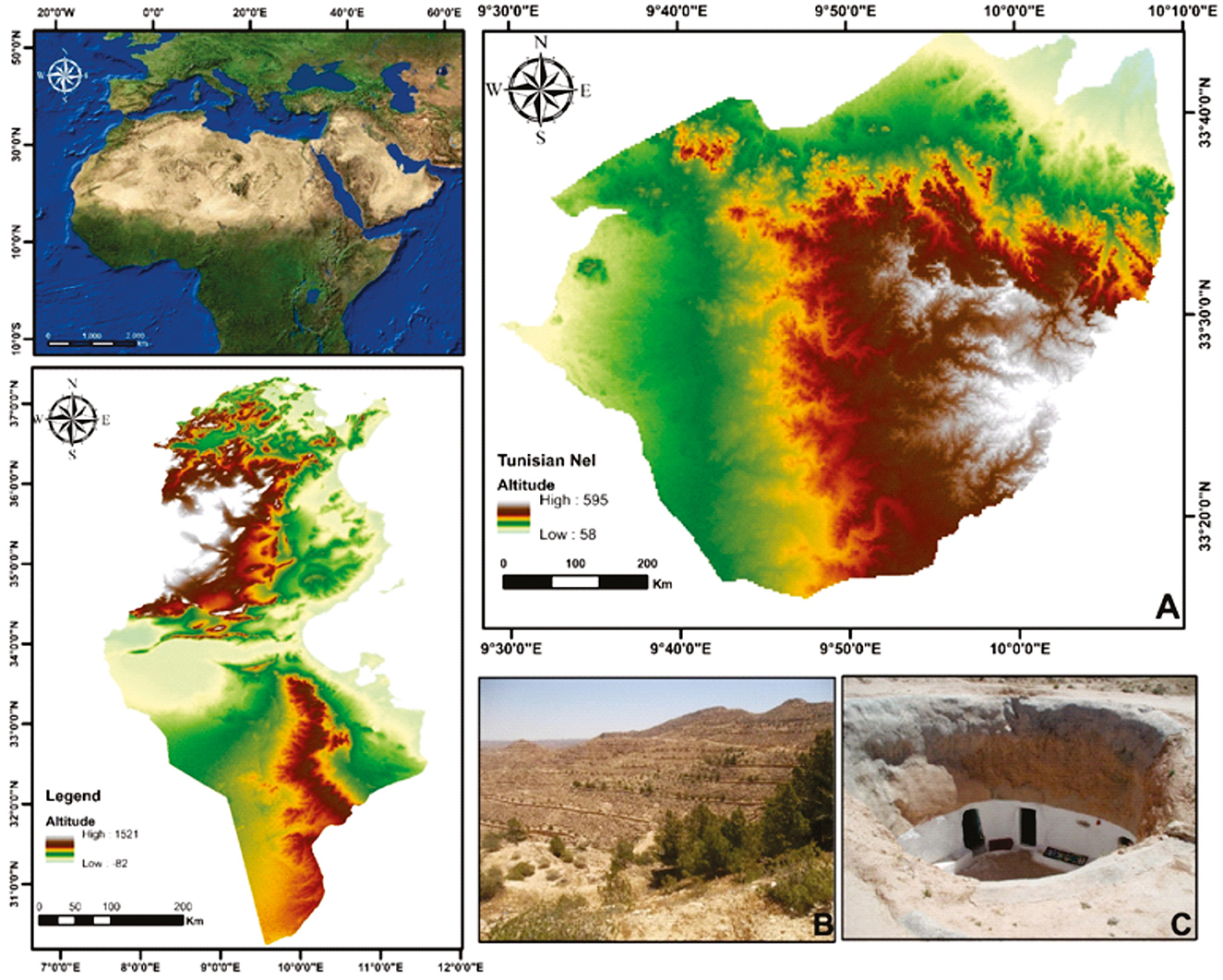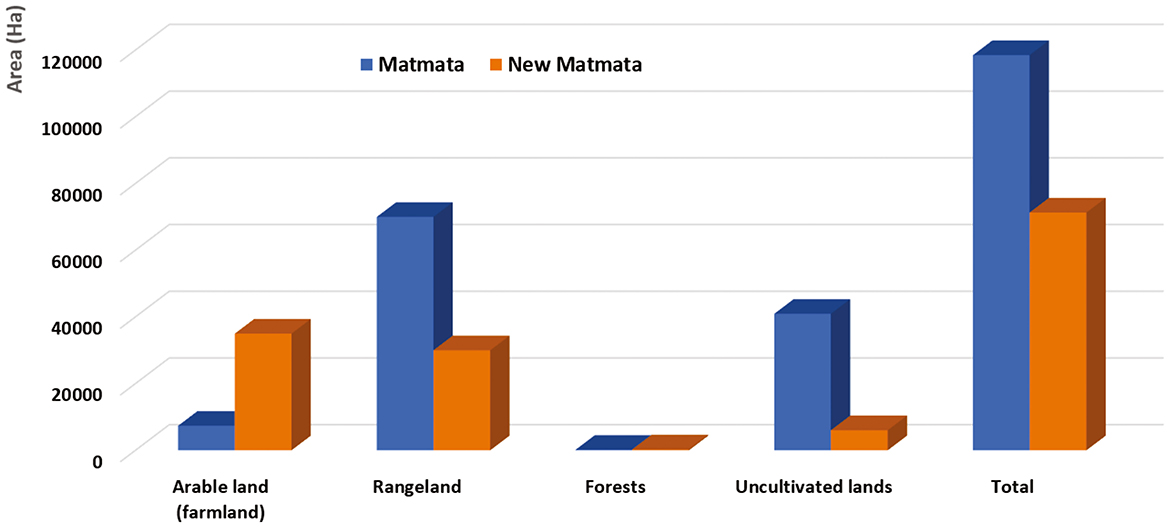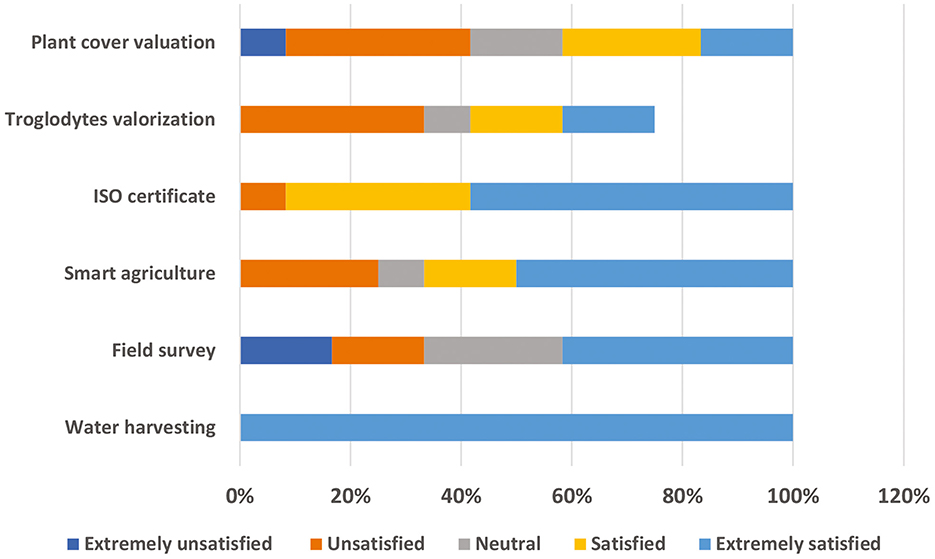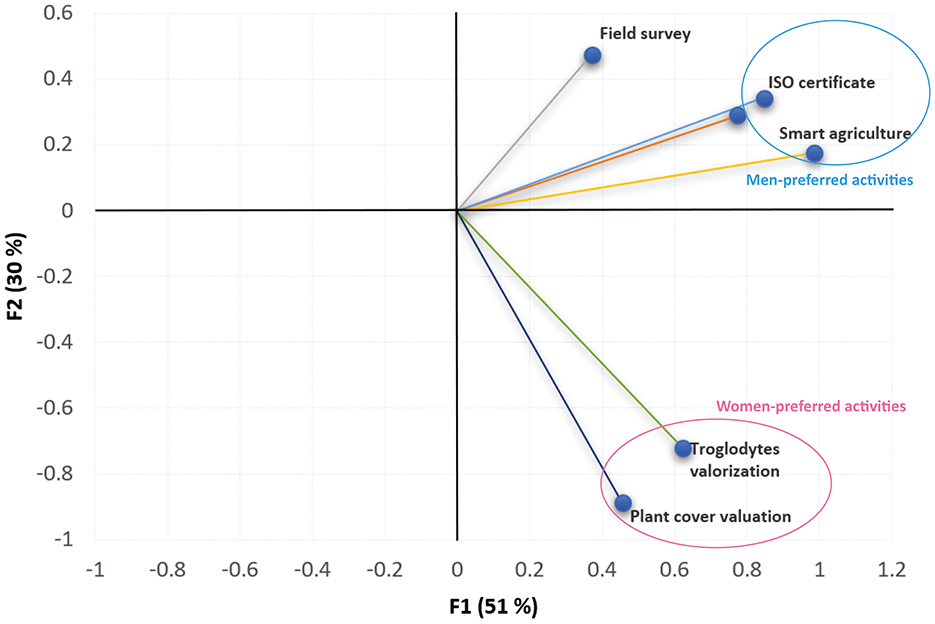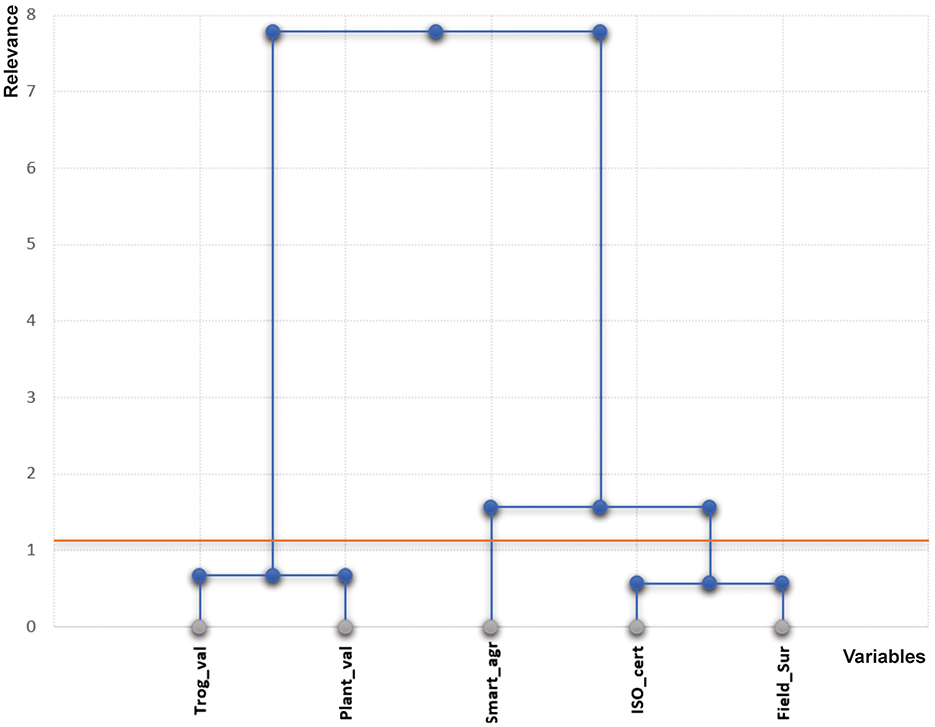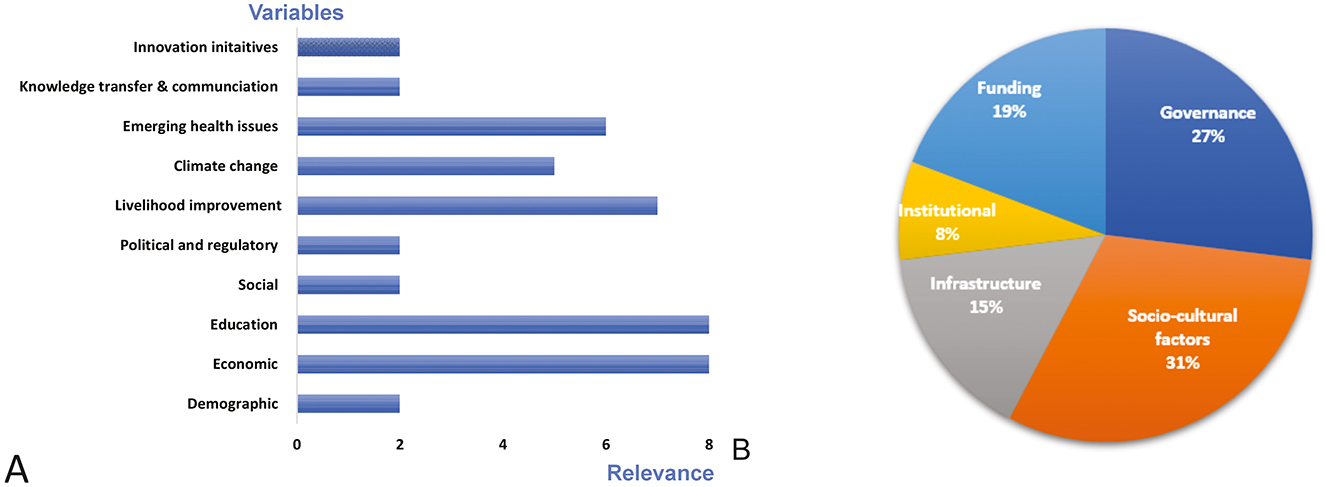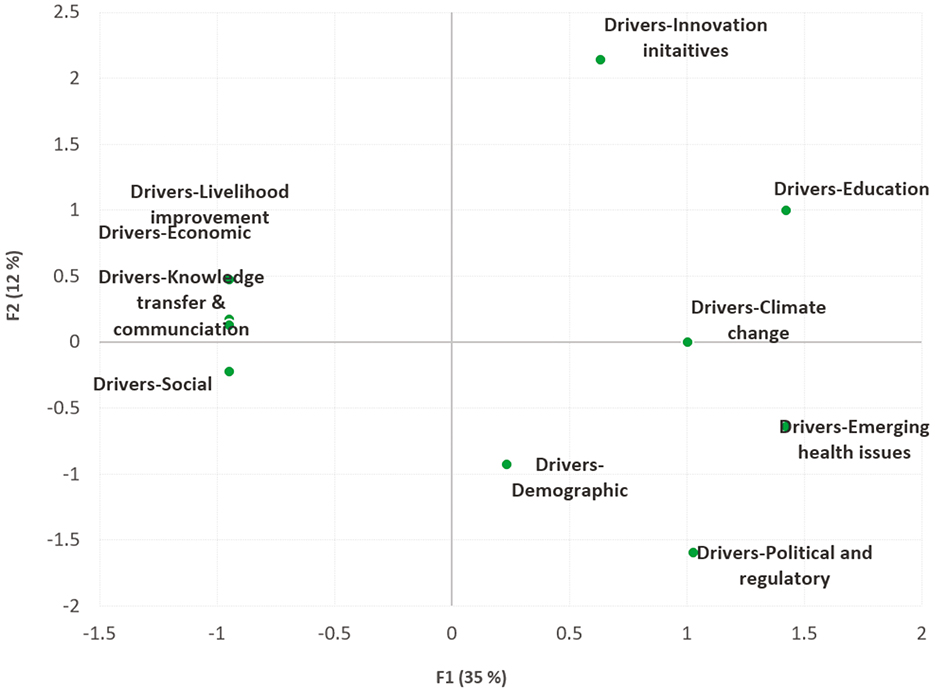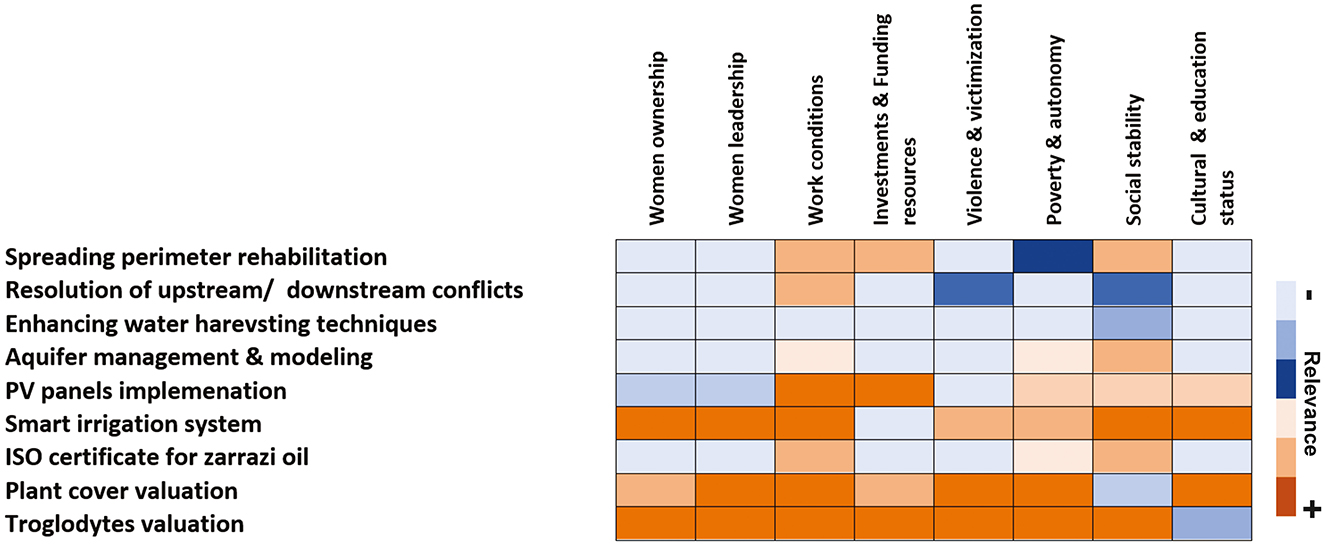- 1Laboratory of Eremology and Combating Desertification—Arid Regions Institute, Medenine, Tunisia
- 2XPRO Consulting Limited (XPRO), Nicosia, Cyprus
- 3Department of Civil and Environmental Engineering (UNIFI), University of Florence, Florence, Italy
- 4Department of Civil Engineering and Computer Science, University of Rome Tor Vergata, Rome, Italy
- 5Institute of Environment, Florida International University, Miami, FL, United States
Introduction: Climate variability and socio-environmental challenges are often assessed separately, overlooking their interdependencies. This siloed management approach may mitigate one issue while inadvertently intensifying others. The Water, Energy, Food, and Ecosystem (WEFE) nexus approach provides, however, a holistic framework for understanding these interconnected systems and promoting sustainable resource management with particular attention to gender mainstreaming and social inequality.
Methodology: This paper establishes, consequently, a baseline study for applying the WEFE nexus transition scheme in the Matmata region, a semi-arid area characterized by an important rural exodus, limited water resources, and monoculture agrosystems. Using a participatory, community-driven approach, data were collected during field surveys, face-to-face meetings, multi-stakeholder dialogue, the Delphi method, focus group discussions, and the nominal group technique. Qualitative data were statistically treated using inter-rater coding. Findings highlight sociocultural barriers as a major constraint to women's effective participation in the Nexus Ecosystem Laboratory (NEL) of Matmata. Economic dependency stemming from family agricultural unpaid work restricts their inclusion in the decision-making process and ownership rights. Their growing awareness of nature-based solutions and motivation to initiate micro-projects that valorize local natural and cultural assets align with the nexus transition schemes.
Results and discussion: Promoting institutional arrangements and enhancing gender inclusion are pivotal for driving systemic transformation. The research emphasizes that fostering gender equity is integral to economic sustainability. The successful shift toward the WEFE nexus governance approach must incorporate overlooked social dimensions and invest in community-based strategies, expanding the nexus toolkits for a flexible and adaptive approach.
1 Introduction
The water, energy, food, and ecosystem (WEFE) nexus is a holistic cross-sectoral approach for natural resources management while addressing economic and social challenges and needs (Zhang et al., 2018a,b; Mabhaudhi et al., 2019; Feenstra and Özerol, 2020; Naidoo et al., 2021; Khadka, 2022; Sánchez-Zarco and Ponce-Ortega, 2023). By assessing systems and trade-offs among interconnected systems, it develops a cohesive framework for sustainable management by prioritizing both short- and long-term interventions and actions. The WEFE nexus approach has gained increasing recognition; however, it requires a clear consensus on implementation to translate the theoretical concepts of nexus thinking into actionable strategies in the field (nexus doing). The Nexus project addresses this gap by fostering a community-driven participative approach, enabling stakeholders to develop a shared vision of a transition plan while promoting economic development, environmental sustainability, and social inclusion (Schneider, 2021; Jalonen et al., 2023; Caporali et al., 2023; Schneider et al., 2024; McCartney and Ringler, 2024).
Ensuring equitable access to resources, promoting public opportunities to build resilience in changing environments, and fostering multi-stakeholder dialogue are essential for sustainable management. These efforts require shared responsibilities through social inclusion of women, youth, and disadvantaged groups, alongside the development of an institutional framework supporting equity and integration. These measures form the cornerstone of effective management plans, socio-political stability, and poverty reduction, as outlined in the Nexus Transition Scheme (Figure 1) (Ringler et al., 2013; Hlahla, 2022). Social integration refers to the individual's active participation in social activities and their cognitive engagement with their environment (Brissette et al., 2000). Additionally, it involves, furthermore, identifying individual social roles to enhance networks of social ties (Graham et al., 2017). Addressing social issues that challenge on-the-ground interventions requires a thorough review of governance frameworks and political guidelines to design effective ecological resilience strategies based on the complementarity of initiatives from diverse societal groups (Albrecht et al., 2018; Hlahla, 2022).
The Water-Energy-Food (WEF) nexus has expanded in recent years as a conceptual framework for promoting the sustainable management of natural resources, based on the assessment of synergies and trade-offs between its three pillars. Increasing energy consumption, energy-related pollution, water scarcity, and challenges in water availability—as well as food insecurity and agro-based economic pressures—have raised concerns about the efficiency of mono-sectoral management strategies. The WEF nexus approach aims to internalize social, governance, and development considerations while assessing the interlinkages between water, energy, and food systems. Since the Bonn Conference in 2011, the broader application of the WEF nexus approach has sought to address three global concerns: water, energy, and food security (Shannak et al., 2018; Moreschi et al., 2024; Schlemm et al., 2024; Albrecht et al., 2018; Dargin et al., 2018; Fernández-Ríos et al., 2022; Cui et al., 2024; Lazaro et al., 2022).
Growing attention to the WEF nexus has also led to its expansion into additional fields and systems—particularly those related to climate and ecosystems. Indeed, the widespread application of this framework in macro-areas highlights its adaptability in addressing a critical knowledge gap: the interrelated human pressures on the natural environment. This is achieved by quantifying both direct and indirect impacts (WEFE nexus), or by evaluating the effectiveness of adaptation and mitigation measures (WEFC nexus). The WEFE nexus approach represents a refinement of the original concept, acknowledging the importance of incorporating environmental, political, social, and economic dimensions (Lawford et al., 2013; De Grenade et al., 2016; Biba, 2015; Biggs et al., 2015). To be effective, the WEFE approach must understand the dynamics of nexus systems, recognizing that trade-offs and resource-use efficiency are shaped by social inclusion, gender equity, and socio-ecological resilience (Scott et al., 2014; Foran, 2015; Chang et al., 2016).
Analysis of the nexus framework is frequently conducted at regional and local scales rather than at the national level, in order to support bottom-up approaches and ensure meaningful participation of local actors. Given the incorporation of multiple drivers and dimensions in the nexus framework, and the rapid development of analytical toolkits, gender-sensitive management and gender-equity values require nexus-specific assessments that emphasize social resilience and community-driven approaches for problem framing and promoting cross-sectoral collaboration (Keskinen et al., 2016; Smajgl et al., 2015; Foran, 2015). Recent studies have shown that the nexus conceptual model and its qualitative parametrization, when aligned with collaborative approaches, help to address broad challenges, amplify diverse voices, and foster convergent thinking (Albrecht et al., 2018; De Strasser et al., 2016; Karlberg et al., 2015; Howarth and Monasterolo, 2017; Villamayor-Tomas et al., 2015; Wolfe et al., 2016).
The Nexus project embeds these principles in four NELs across Italy, Spain, Egypt, and Tunisia, fostering transition schemes through innovation cooperation, capacity building, and policy development (Schneider, 2021; Caporali et al., 2023; Schneider et al., 2024). Social equity and inclusion are critical for effective resource management, political stability, and social development. Thus, addressing governance constraints and regulatory barriers related to gender inequalities is a key component in decision-making, with leadership roles representing a fundamental principle of the WEFE nexus transition scheme (Zhang et al., 2018a,b; Wang and Naveed, 2019; Feenstra and Özerol, 2020; Naidoo et al., 2021; OECD, 2021; Buchy et al., 2023; Khadka, 2022; Sánchez-Zarco and Ponce-Ortega, 2023; McCartney and Ringler, 2024; Schlemm et al., 2024). Prioritizing gender mainstreaming and ensuring that women and men participate actively in resource management and sustainable development strategies enhances the recognition of women's role in economic sustainability. The lack of standard methodologies for measuring gender impacts necessitates the development of a comprehensive analytical framework with reliable indicators based on relevant and accurate data, reflecting the perceptions of marginalized groups and the effectiveness of targeted interventions for addressing gender disparities (OECD, 2021).
In Tunisia, climate variability, resource allocation pressures, economic expansion, and growing population needs disproportionately affect women and men. Unpaid domestic and care work limits the ability of women to integrate into economic activities, as they spend an average of 18 hours per day on unpaid domestic care and family agriculture. Additionally, while female labor force participation has increased over the years, they remain concentrated in low-paying jobs and informal employment with limited career advancement opportunities. Correspondingly, there has been a significant decline in women's participation in the agricultural sector, with a shift toward service-based employment between 2011 and 2021, largely due to the unrecognized burden of family responsibilities. Despite continuous efforts to promote effective integration through policy and management strategies, economic and social disparities persist. The percentage of parliamentary seats held by women has increased from 11.5 to 16.2% between 2000 and 2023, yet economic indicators are still revealing ongoing challenges. Cultural barriers in rural areas, vulnerable employment conditions for women in need, and their limited participation in decision-making and leadership processes exacerbate these issues.
The gender-sensitive WEFE nexus frameworks focus, consequently, on addressing these disparities by acknowledging the direct and indirect contribution of women to water, energy, food, and ecosystem management efforts (Walker et al., 2016; Zhang et al., 2018a,b; Wang and Naveed, 2019; Feenstra and Özerol, 2020; Naidoo et al., 2021; OECD, 2021; Buchy et al., 2023; Khadka, 2022; Sánchez-Zarco and Ponce-Ortega, 2023; McCartney and Ringler, 2024; Schlemm et al., 2024). Nonetheless, integrating gender equality and social inclusion effectively into the transition scheme requires baseline studies across different regions and contexts. Developing the most appropriate integration framework requires, however, recognizing women as active agents of change and strengthening their transformative potential. In this context, this work presents a baseline study for addressing gender equity to ensure WEFE transition schemes. It focuses on gender-sensitive alternatives to promote women's integration into the sustainable management of the Matmata region based essentially on the dynamic feedback of integrated stakeholders. Indeed, a well-structured integration of different social groups enhances multi-sectoral collaboration and promotes long-term resilience through effective capacity-building measures and community-driven changes.
2 Site description
The study area, the Matmata region, is located in southeastern Tunisia, between the Dahar Plateau and the Djeffara plain (Figure 2). It is characterized by an average annual rainfall of 170 mm with increasing extreme events such as floods (2017, 2023, 2024) and recurring drought periods between 2018 and 2022 during which the average rainfall is < 120 mm. The region includes both mountainous areas and flat plains and is devoted principally to agriculture activities, particularly the cultivation of the locally specific olive variety “Zarrazi.” Agriculture holds socio-cultural, economic, and ecological significance; therefore, various management plans have been adopted since the 1990s.
2.1 Population
The local population is about 14,224 and 4,444 inhabitants for New Matmata [EC1] and Matmata cities, respectively, with women comprising 53.5 and 52% of the populations, respectively. A declining population trend has been observed with a decrease of 1,745 and 13,222 inhabitants, respectively, for both regions compared to 2004 (INS, 2023).
2.2 Education
The illiteracy rate among individuals over 10 years old is ~32.5 and 30% for Matamata and New Matamata, respectively, with female illiteracy rates at 40 and 37.5%. The overall activity ratio of the study area is about 31%, of which only 12.4 and 13.3% are for female activities for both Matmata and New Matmata, respectively. The unemployment rate for university graduates is ~40.7%, with women facing an even higher unemployment rate of 53.8 and 52.5% for women in New Matamata and Matmata, respectively. Additionally, the region recorded an average migration rate of 1,387 for 2022, of which more than 52% were seeking employment opportunities and improved living conditions. The emigration rate exceeds 200 persons/year, with 90% of cases related to job and vacancy searches (CRDA, 2022).
2.3 Energy
Despite the region's important solar radiation duration and dominant wind currents, particularly in the mountainous area, public photovoltaic (PV) panels or wind power stations have yet to be implemented to support renewable energy production.
2.4 Employment
Regarding job applications, more than 61 and 64% are submitted by women in Matmata and New Matmata regions, respectively. Social aid is provided to 1,218 families in need within the region.
2.5 Agriculture and livestock
As illustrated by Figure 3, the region has 1,475 ha of irrigated public perimeters distributed among 14 private parcels with a total production of 5,151 tons, primarily from olive trees (Zarrazi, Chemlali, etc.). Livestock farming is the main economic income resource in the region, with a total count of 74,855 (CRDA, 2021).
2.6 Socio-economy
To address social conflicts related to shared resource use, various social organizations and governmental institutions collaborate. These include 14 associations for shared organizational management, a vulgarization unit (a government institution at the local level providing farmers with technical assistance and information), and five agricultural development associations. The region received in 2022, 20 new agricultural management projects compared to 29 in 2021 and 10 additional interventions planned in 2022 and 15 for 2021. However, the industrial sector remains underdeveloped, with two investments generating 20 jobs. The planned service-sector projects expect 30 employment opportunities. The tourism sector reveals, however, significant potential. The total number of visitors reached 8,746 with most visits lasting a single day. The development of this sector is closely linked to traditional crafts and traditional products specific to the region. Despite a considerable number of certified persons, 75% of whom are women, only one project was assigned to the region with limited employment opportunities (CRDA, 2022).
3 Methodology
The analytical framework for implementing the WEFE Nexus approach in Matmata is rooted in iterative stakeholder integration for common validation of the nexus management plan. By promoting cross-sectoral dialogue, the framework focuses on fostering mutual understanding and knowledge sharing, assessing feedback dynamics and group thinking, and ensuring open, free expression of opinion. Despite uncertainties linked to natural system variability and context-specific challenges, the framework encourages open expression, adaptive management, and collective consensus-building.
3.1 Stakeholder engagement
Stakeholder engagement was facilitated via public meetings, discussions, training sessions, and interactive workshops open to diverse community members, men and women, both elderly and young. These meetings served as a platform that brought together policymakers, scientific experts, farmers, government and non-government institutions, civil society, young investors, academia, and students. To prioritize local concerns and challenges, participants used a hierarchical ranking during public sessions, voting on the proposed solutions using a 0–5 scale. This process prioritized the most pressing concerns for the local community and identified solutions aligned with population needs.
To gather targeted insights and deepen engagement of key agents, multiple methods were used namely:
• Focus group discussion (FGD): This provides a structured platform for multi stakeholder discussion. These planned face-to-face meetings focus on gathering insights, concerns, and solutions for a collective cross-sectoral dialogue.
• Nominal group technique (NGT): This technique is often used to collect, evaluate, capture, and aggregate feedback and opinions regarding a common object within predefined spatio-temporal limits (Delbecq and Van de Ven, 1971; De Ven and Delbecq, 1972; Anon, 1976). Generally associated with the Delphi method, the NGT fosters the prioritization of the individually expressed opinions and the identification of innovative ideas, synthesizing different contributions in order of relevance. It addresses issues related to the sustainable development of the Matmata region and the key factors influencing a successful WEFE transition scheme.
• Delphi method: the interactive method involves multiple surveys to gather stakeholders' opinions and perceptions regarding WEFE management approach challenges, potential transition scheme, and prioritized actions. It is a structured process appropriate for addressing complex issues (Hugé et al., 2009) and is widely used in governance, sustainable development, and environmental studies (Grisham, 2009; Boulkedid et al., 2011; Rikkonen et al., 2006). This method focuses on organizing multiple stakeholder groups geographically dispersed into collective feedback assessment mechanisms (Grisham, 2009; Boulkedid et al., 2011; Rikkonen et al., 2006) to provide a common agreement of evidence related to the decision-making process.
• Field survey: to ensure a participatory approach and strengthen collaboration among different stakeholders in the nexus management plan, a field survey was conducted among the local population. The main objective is to assess the individual perceptions of the WEFE nexus approach, the nexus transition scheme, nexus-ness project activities, and the feasibility of the proposed solutions discussed in previous meetings and open discussions. Furthermore, the survey aimed to outline key needs for the Tunisian NEL, focusing on the social inclusion of different social groups, particularly women, who are underrepresented in participatory sessions (participation between 18 and 33%). The survey sought to evaluate their motivation, identify main barriers and constraints to their effective participation and highlight their perspectives on enhancing their integration in governance and management processes. Structured in three different sections, the questionnaire captured unobservable behaviors, perceptions, and attitudes beyond those typically expressed and revealed during public discussions, offering a confidential platform for individual responses. This methodology reduced non-response bias, social desirability bias, and interest bias, providing, consequently, a deeper understanding of community dynamics. Findings showed that the tailored engagement process strengthened the participation and the motivation of both men and women.
3.2 Data analysis
The collected data from field surveys, stakeholder dialogue, and public discussions were assessed via SPSS software to outline significant statistical correlations between key variables. A historical classification of challenges and potential solutions was created using the free Heatmapper platform, providing insightful information about the community-driven forces, constraints, and solutions. To ensure methodology consistency and data reliability, qualitative findings were analyzed via integrated coding, a validated approach for standardizing data. The trustworthiness of the results reinforced the validity of the proposed management plan to align with community goals and needs.
4 Results and discussions
4.1 WEFE nexus transition scheme
In the Matmata region, NEL stakeholders were identified, engaged, and trained on the water, energy, food, and ecosystem (WEFE) approach to develop initiatives and establish a cooperative framework for the nexus management. Stakeholders classified pressing challenges for the WEFE nexus that required short-term interventions. This list of prioritized actions, however, differed from the priorities identified during training sessions and open meetings with governmental institutions and non-governmental organizations. Participants identified water availability and quality as the primary challenge. The use of unsuitable water for irrigation, particularly with high salinity and alkalinity, was reported to threaten sustainable food productivity and soil fertility. The maintenance of ecosystem services and the local plant cover was noted as a secondary concern. Stakeholders emphasized diversifying income sources and moving away from monoculture agrosystems. Nature-based solutions, including the valuation of the local biological resources, salt-tolerant plants, and drought-resistant crops, were highlighted as necessary. Small-scale projects based on these solutions (dairy industry, poultry, local ecological farm, etc.) were supported by women enabling economic income (Figure 4).
Participants identified effective coordination, cooperation, and a participatory approach as essential for implementing the WEFE nexus transition scheme. Female stakeholders, furthermore, stressed the necessity of gender-sensitive alternatives. Key elements for securing WEFE nexus transition, according to participants, included social integration, gender equity issues, institutional arrangements, and funding resources, with 42, 17, 17, 8, and 16%, respectively. Consequently, they identified the main challenges for the nexus management plan in the region as social influence, governance, and regulatory frameworks. Traditional ancestral techniques commonly used have proven effective in mitigating climate variability and increasing drought frequency. Indigenous knowledge was emphasized as a key element in a sustainable valuation of the NEL's natural resources.
4.2 Gender-sensitive management
The agriculture sector in the region is male-dominated. Gender dynamics and participation are underestimated in fostering agricultural development and natural resource management. Women, despite owning the cultivated parcels, are excluded from decision-making and have limited access to distribution and marketing activities. Surveys further revealed that lack of coordination among local actors amplifies allocation issues and social conflicts. The male-dominated governance, therefore, excludes differing perspectives on gender dynamics.
Survey results indicate that 25% of participants believed that women were not effectively integrated into social and economic activities, while 75% noted the significant female participation in different sectors, primarily as workers (58%). Additionally, 17 and 9% of respondents highlighted limited property rights and participation in decision-making, while 16% noted challenges in differentiating between women's roles in social and economic activities, though contributions despite a lack of recognition.
These findings align with the national statistics, confirming women bear the majority of family socio-economic responsibilities. Women in the Tunisian Nel are facing long working hours in agriculture, often exceeding the national average, without financial compensation. Despite holding land titles, women are deprived of the right to rent or sell land. Financial control and decisions are exclusively attributed to men.
The survey revealed, additionally, differing priorities between men and women. Women confirm that family-agriculture work is a source of gender-based violence, leading them to seek alternative ways to develop their own micro-project based primarily on nature-based solutions (NBS) and the valuation of ecosystem services within the local context. Women's prioritized activities are, consequently, related to plant cover and troglodyte valuation and tourism development. Men favored agricultural interventions. Female participants expressed the need for independent projects. Besides the lack of gender-sensitive governance and a regulatory context to foster these initiatives, women cite a lack of funding and technological support. The lack of appropriate infrastructure and unfavorable cost-benefit balance for some activities or small-scale projects dampens, however, women's enthusiasm for economic integration. Effective integration of women requires addressing obstacles in launching projects, limited access to technology, and poor communication with institutions. Although some women-led projects have gained national recognition, sustaining these initiatives remains a challenge.
The statistical treatment (Principal Components Analysis PCA and Hierarchical Cluster Classification HCA) of the data obtained from the field survey, along with the distribution of the project's main activities, revealed two distinct groups corresponding to the activity priorities of men and women. For female participants, the key management measures focused on the valuation of plant cover and troglodyte heritage, as well as the development of the tourism sector. As one participant affirmed: “I want to break away from family farming: hard work with no recognition and continuous financial struggles. The only solution is to work far from home, no matter the job.”
In contrast, male-preferred activities were related to integrated interventions in the agriculture sector (Figures 5, 6). Gender assumptions in the study area, particularly regarding the lack of financial and technological support for women's initiatives, limit opportunities for women to implement independent projects. As confirmed by another participant, “We strive to balance our work and family responsibilities, which requires having our own projects. Indeed, each of us has ideas and strong motivation to pursue them, but the lack of funding resources represents a huge barrier.” Enhancing women's meaningful leadership and ownership within the local context opens new avenues for empowering them as independent stakeholders while also improving their access to funding opportunities. The development of gender-focused initiatives—especially considering the capacity of women involved in the Nexus Ecosystem Living Laboratories (NEL) to adapt and their enriched knowledge in farming and tourism sectors—creates opportunities for gender-based entrepreneurship.
This, in turn, increases the chances of integrating women into the decision-making process as independent stakeholders, a much-needed step, particularly in the agriculture sector (Figure 5). However, according to participants, women's integration into the agricultural sector and fieldwork remains challenging. Key obstacles include difficulties in launching independent female-led projects, limited access to technology, and restricted communication with both governmental and non-governmental institutions. Although some small-scale projects led by women have received national recognition, ensuring the sustainable management of these pilot initiatives remains problematic (Figures 5, 6).
4.3 Women's integration: driving forces and constraints
Women, who are affected disproportionately more than men by resource scarcity, have raised concerns about a thorough understanding of the transition measures toward the WEFE approach. This requires, consequently, an in-depth evaluation of gender inequality within the transition scheme regarding women's opportunities, rights, and responsibilities. Indeed, achieving a climate-resilient system requires understanding gender-specific capacities and addressing inequalities of proven decision-making and leadership (Figure 7). Field surveys and stakeholder discussions identified key factors influencing women's participation. Education was a major factor driving change and women's enthusiasm to develop independent projects (Figure 7A), especially for youth seeking alternatives to traditional roles. The diversification of economic sources and the emerging health issues, namely the COVID-19 pandemic, have raised concern about the financial autonomy of women pushing for improving the livelihood, ensuring access to innovative solutions and valorizing women's initiatives. “After the COVID pandemic, we have no choice but to work. Simply, we don't have enough money to survive,” one participant affirmed.
Constraints included lack of infrastructure, restrictive institutional arrangements (Figure 7B) and socio-cultural norms that limit women's mobility and access to resources. Stakeholders noted, additionally, the need for gender-blind selection and cooperation across stakeholders to ensure equitable opportunity distribution. The participants emphasize the gender biases related to resource management and access.
Statistical analysis indicated that education and innovation accounted for 35% of the distribution. Women showed limited interest in agricultural land development due to unpaid work of women, labor intensity, and socio-economic constraints. An increasing attention is, however attributed in concordance with previous results, to the opportunities of tourism development and new small projects development enhancing, consequently, the financial autonomy of women and the independence for leadership opportunities “I want to enhance my troglodyte house as I still live in it and I wish to improve some structures; however, the lengthy and complex procedures with the lack of funding resources inhibit me from moving forward,” one participant said. Smart irrigation was noted as a promising integration pathway (Figure 8).
The second component related to regulatory and political contexts, management strategies for mitigating climate variability, and emerging health issue impacts. It emphasizes the increasing recognition of women's role through institutional reforms. Adoption of technologies such as smart irrigation and certifications like ISO were linked to open international marketing communication ways that may develop opportunities for innovation and entrepreneurship (Figure 9). To successfully develop a common vision for sustainable management of the region, the key driving factors of gender inequality and social inclusion are outlined. Those sociocultural factors highlight the abilities of the local communities to adapt and to innovate the alternatives of resilience.
5 Synthesis
The research highlights the undervaluation of women's participation in economic and social activities and the dynamics of gender equality and social inclusion in management programs, particularly in the Matmata region, a representative example of arid and semi-arid regions of North Africa. Despite their active roles and strong motivation to engage in innovative, often non-agricultural micro-projects, women face systematic barriers that limit their participation. The findings of this research highlight that women are highly motivated to develop innovative solutions and integrate new technologies. The study reveals that women possess a deep reservoir of indigenous knowledge, which is critical to preserving local heritage and enhancing community resilience. Sociocultural constraints, limited infrastructure, and lack of institutional support continue to impede their full integration into independent economic activities. Addressing social inclusion in participatory transformative programming is currently undermined by a lack of tangible field-level implementation of clear guidance for local communities.
Targeted policy interventions are essential, prioritizing the institutionalization of gender-sensitive practices and ensuring women's representation in planning and decision-making bodies. Enhancing legal protections, funding and technological support, training sessions, and capacity-building programs guarantees equal participation in economic and social activities. The development of governance models using quantitative and qualitative indicators of social inclusion may facilitate real-time intervention and strategy adaptation. The potential role of advanced technologies (smart irrigation, renewable energy, platforms, ….) is acknowledged, while it remains insufficiently developed for gender-sensitive programs. Tailored training and financial access to these innovative alternatives require equitable distribution of opportunities.
Data availability statement
The original contributions presented in the study are included in the article/Supplementary material, further inquiries can be directed to the corresponding author.
Ethics statement
Ethical approval was not required for the studies involving humans because the used methodology is face to face meetings and Delphi method with anonym response. The studies were conducted in accordance with the local legislation and institutional requirements. Written informed consent for participation was not required from the participants or the participants' legal guardians/next of kin in accordance with the national legislation and institutional requirements because we have used a field questionnaire and the participants agreed to participate.
Author contributions
HB: Writing – original draft, Writing – review & editing. AM: Writing – original draft, Writing – review & editing. XT: Writing – original draft, Writing – review & editing. FA: Writing – original draft, Writing – review & editing. EC: Writing – original draft, Writing – review & editing. BR: Writing – original draft, Writing – review & editing. FN: Writing – original draft, Writing – review & editing. MO: Writing – original draft, Writing – review & editing.
Funding
The author(s) declare that financial support was received for the research and/or publication of this article. This work was developed as part of the PRIMA NEXUS-NESS project. Authors were partially supported by NEXUS-NESS funding from the PRIMA Programme, an Art.185 initiative supported and funded under Horizon 2020, the European Union's Framework Programme for Research and Innovation. This is publication #2009 from the Institute of Environment at Florida International University.
Conflict of interest
XT was employed by XPRO Consulting Limited (XPRO).
The remaining authors declare that the research was conducted in the absence of any commercial or financial relationships that could be construed as a potential conflict of interest.
Generative AI statement
The author(s) declare that no Gen AI was used in the creation of this manuscript.
Publisher's note
All claims expressed in this article are solely those of the authors and do not necessarily represent those of their affiliated organizations, or those of the publisher, the editors and the reviewers. Any product that may be evaluated in this article, or claim that may be made by its manufacturer, is not guaranteed or endorsed by the publisher.
Supplementary material
The Supplementary Material for this article can be found online at: https://www.frontiersin.org/articles/10.3389/frwa.2025.1563873/full#supplementary-material
References
Albrecht, T. R., Crootof, A., and Scott, C. A. (2018). The water-energy-food nexus: a systematic review of methods for nexus assessment. Environ. Res. Lett.13:043002. doi: 10.1088/1748-9326/aaa9c6
Anon (1976). GROUP TECHNIQUES FOR PROGRAM PLANNING: A GUIDE TO NOMINAL GROUP AND DELPHI PROCESSES Andre L. Delbecq, Andrew H. Van de Ven, and David H. Gustafson Glenview, III.: Scott, Foresman, 1975. xv plus 174 pp., $ 4.95, paperbound. INTERPERSONAL CONFLICT RESOLUTION Alan C. Filley Glenview, III.: Scott, Foresman, 1975. 180 pp., $ 4.95, paperbound. Group Org. Stud. 1:256. doi: 10.1177/105960117600100220
Biba, S. (2015). The goals and reality of the water–food–energy security nexus: the case of China and its southern neighbours. Third World Q. 37, 51–70. doi: 10.1080/01436597.2015.1086634
Biggs, E. M., Bruce, E., Boruff, B., Duncan, J. M., Horsley, J., Pauli, N., et al. (2015). Sustainable development and the water–energy–food nexus: a perspective on livelihoods. Environ. Sci. Policy 54, 389–397. doi: 10.1016/j.envsci.2015.08.002
Boulkedid, R., Abdoul, H., Loustau, M., Sibony, O., and Alberti, C. (2011). Using and reporting the Delphi method for selecting healthcare quality indicators: a systematic review. PLoS ONE 6:e20476. doi: 10.1371/journal.pone.0020476
Brissette, I., Cohen, S., and Seeman, T. E. (2000). Measuring Social Integration and Social Networks. New York, NY: Oxford University Press, 53–85.
Buchy, M., Elias, M., and Khadka, M. (2023). Invisible women: barriers for women professionals in the water, energy, food, and environment sectors in Nepal. Front. Sustain. Food Syst. 7:1146187. doi: 10.3389/fsufs.2023.1146187
Caporali, E., Rizzo, B. M., Schneider, X., El Jeitany, J., and Pacetti, T. (2023). Gender dimension for Nexus Ecosystem Lab Innovation Ecosystem. PRIMA NEXUS-NESS Innovation Action (PRIMA H2020 GA 2042), Project Deliverable 2.3, 30 November 2022.]
Chang, Y., Li, G., Yao, Y., Zhang, L., and Yu, C. (2016). Quantifying the water-energy-food nexus: current status and trends. Energies 9:65. doi: 10.3390/en9020065
Cui, S., Adamowski, J. F., Wu, M., Zhang, P., Yue, Q., and Cao, X. (2024). An integrated framework for improving green agricultural production sustainability in human-natural systems. Sci. Total Environ. 945:174153. doi: 10.1016/j.scitotenv.2024.174153
Dargin, J., Daher, B., and Mohtar, R. H. (2018). Complexity versus simplicity in water energy food nexus (WEF) assessment tools. Sci. Total Environ. 650, 1566–1575. doi: 10.1016/j.scitotenv.2018.09.080
De Grenade, R., House-Peters, L., Scott, C., Thapa, B., Mills-Novoa, M., Gerlak, A., et al. (2016). The nexus: reconsidering environmental security and adaptive capacity. Curr. Opin. Environ. Sustain. 21, 15–21. doi: 10.1016/j.cosust.2016.10.009
De Strasser, L., Lipponen, A., Howells, M., Stec, S., and Bréthaut, C. (2016). A methodology to assess the water energy food ecosystems nexus in transboundary river basins. Water 8:59. doi: 10.3390/w8020059
De Ven, A., and Delbecq, A. (1972). The nominal group as a research instrument for exploratory health studies. Am. J. Public Health 62, 337–342. doi: 10.2105/AJPH.62.3.337
Delbecq, A. L., and Van de Ven, A. H. (1971). A group process model for problem identification and program planning. J. Appl. Behav. Sci. 7, 466–492. doi: 10.1177/002188637100700404
Feenstra, M., and Özerol, G. (2020). Energy justice as a search light for gender-energy nexus: towards a conceptual framework. Renew. Sustain. Energy Rev. 138:110668. doi: 10.1016/j.rser.2020.110668
Fernández-Ríos, A., Laso, J., Amo-Setién, F. J., Abajas-Bustillo, R., Ortego-Mate, C., Fullana-I-Palmer, P., et al. (2022). Water–energy–food nexus and life cycle thinking: a new approach to environmental and nutritional assessment of potato chips. Foods 11:1018. doi: 10.3390/foods11071018
Foran, T. (2015). Node and regime: Interdisciplinary analysis of water-energy-food nexus in the Mekong region. Water Altern. 8, 655–674.
Graham, A. L., Zhao, K., Papandonatos, G. D., Erar, B., Wang, X., Amato, M. S., et al. (2017). A prospective examination of online social network dynamics and smoking cessation. PLoS ONE 12:e0183655. doi: 10.1371/journal.pone.0183655
Grisham, T. (2009). The Delphi technique: a method for testing complex and multifaceted topics. Int. J. Manag. Proj. Bus. 2, 112–130. doi: 10.1108/17538370910930545
Hlahla, S. (2022). Gender perspectives of the water, energy, land, and food security nexus in sub-Saharan Africa. Front. Sustain. Food Syst. 6:719913. doi: 10.3389/fsufs.2022.719913
Howarth, C., and Monasterolo, I. (2017). Opportunities for knowledge co-production across the energy-food-water nexus: making interdisciplinary approaches work for better climate decision making. Environ. Sci. Policy 75, 103–110. doi: 10.1016/j.envsci.2017.05.019
Hugé, J., Trinh, H. L., Hai, P. H., Kuilman, J., and Hens, L. (2009). Sustainability indicators for clean development mechanism projects in Vietnam. Environ. Dev. Sustain. 12, 561571. doi: 10.1007/s10668-009-9211-6
INS (2023). Official Statistics. Available online at: https://www.ins.tn/en (accessed September 22, 2024).
Jalonen, R., Zaremba, H., Petesch, P., Elias, M., Estrada Carmona, N., Tsvuura, S., et al. (2023). Gender Equity and Social Inclusion in the Water-Energy-Food-Ecosystems (WEFE) Nexus: Online Learning Module. Rome: Alliance of Bioversity International and International Center for Tropical Agriculture (CIAT).
Karlberg, L., Hoff, H., Amsalu, T., Andersson, K., Binnington, T., Flores-López, F., et al. (2015). Tackling complexity: understanding the food-energy-environment nexus in Ethiopia's Lake Tana Sub-basin. Water Altern. 8, 710734.
Keskinen, M., Guillaume, J., Kattelus, M., Porkka, M., Räsänen, T., and Varis, O. (2016). The water-energy-food nexus and the transboundary context: insights from large Asian rivers. Water 8:193. doi: 10.3390/w8050193
Khadka, M. (2022). Why joint Consideration of the Water, Energy, Food, and Environment Sectors Matters for Gender Equality and Inclusivity in Nepal. Colombo, Sri Lanka: International Water Management Institute. Available online at: https://www.iwmi.org/news/why-joint-consideration-of-the-water-energy-food-and-environment-sectors-matters-for-gender-equality-and-inclusivity-in-nepal/ (accessed October 03, 2024).
Lawford, R., Bogardi, J., Marx, S., Jain, S., Wostl, C. P., Knüppe, K., et al. (2013). Basin perspectives on the water–energy–food security nexus. Curr. Opin. Environ. Sustain. 5, 607–616. doi: 10.1016/j.cosust.2013.11.005
Lazaro, L. L. B., Bellezoni, R. A., De Oliveira, J. A. P., Jacobi, P. R., and Giatti, L. L. (2022). Ten years of research on the water-energy-food nexus: an analysis of topics evolution. Front. Water 4:859891. doi: 10.3389/frwa.2022.859891
Mabhaudhi, T., Nhamo, L., Mpandeli, S., Nhemachena, C., Senzanje, A., Sobratee, N., et al. (2019). The water–energy–food nexus as a tool to transform rural livelihoods and well-being in Southern Africa. Int. J. Environ. Res. Public Health 16:2970. doi: 10.3390/ijerph16162970
McCartney, M., and Ringler, C. (2024). Gender Dynamics, Biodiversity, Collective Thinking: Key Elements of the WEFE Approach. Montpellier, France: CGIAR. Available online at: https://hdl.handle.net/10568/145089 (accessed November 05, 2024).
Moreschi, L., Gagliano, E., Gallo, M., and Del Borghi, A. (2024). A framework for the environmental assessment of water-energy-food-climate nexus of crops: development of a comprehensive decision support indicator. Ecol. Indic. 158:111574. doi: 10.1016/j.ecolind.2024.111574
Naidoo, D., Nhamo, L., Mpandeli, S., Sobratee, N., Senzanje, A., Liphadzi, S., et al. (2021). Operationalising the water-energy-food nexus through the theory of change. Renew. Sustain. Energy Rev. 149:111416. doi: 10.1016/j.rser.2021.111416
OECD (2021). Gender and the Environment: Building Evidence and Policies to Achieve the SDGs. Paris: OECDPublishing.
Rikkonen, P., Kaivo-oja, J., and Aakkula, J. (2006). Delphi expert panels in the scenario-based strategic planning of agriculture. Foresight 8, 66–81. doi: 10.1108/14636680610647156
Ringler, C., Bhaduri, A., and Lawford, R. (2013). The nexus across water, energy, land and food (WELF): potential for improved resource use efficiency? Curr. Opin. Environ. Sustain. 5, 617–624. doi: 10.1016/j.cosust.2013.11.002
Sánchez-Zarco, X. G., and Ponce-Ortega, J. M. (2023). Water-energy-food-ecosystem nexus: an optimization approach incorporating life cycle, security and sustainability assessment. J. Clean. Prod. 414:137534. doi: 10.1016/j.jclepro.2023.137534
Schlemm, A., Mulligan, M., Tang, T., Agramont, A., Namugize, J., Malambala, E., et al. (2024). Developing meaningful water-energy-food-environment (WEFE) nexus indicators with stakeholders: an Upper White Nile case study. Sci. Total Environ. 931:172839. doi: 10.1016/j.scitotenv.2024.172839
Schneider, X. (2021). Nexus Ecosystem Labs - Innovation Ecosystems Methodology. Project Deliverable 2.1. Available online at: https://prima-nexus-ness.org/wp-content/uploads/2023/03/D2.1.pdf
Schneider, X., Sinobas, L., Bahnassy, M., Hassank, B., Shahin, S., Shahin, K., et al. (2024). Water-Energy-Food-Ecosystem Nexus Transition Through the Responsible Research and Innovation Roadmap—Lessons Learned From Four Mediterranean Countries. Vienna: EGU General Assembly.
Scott, C. A., Kurian, M., and Wescoat, J. L. (2014). The Water-Energy-Food Nexus: Enhancing Adaptive Capacity to Complex Global Challenges. Chem: Springer eBooks, 15–38.
Shannak, S., Mabrey, D., and Vittorio, M. (2018). Moving from theory to practice in the water–energy–food nexus: an evaluation of existing models and frameworks. Water Energy Nexus 1, 17–25. doi: 10.1016/j.wen.2018.04.001
Smajgl, A., Ward, J., and Pluschke, L. (2015). The water–food–energy Nexus – Realising a new paradigm. J. Hydrol. 533, 533–540. doi: 10.1016/j.jhydrol.2015.12.033
Villamayor-Tomas, S., Grundmann, P., Epstein, G., Evans, T., and Kimmich, C. (2015). The water-energy-food security nexus through the lenses of the value chain and the institutional analysis and development frameworks. Water Altern. 8, 735–755.
Walker, R. V., Beck, M., Hall, J., Dawson, R., and Heidrich, O. (2016). Identifying key technology and policy strategies for sustainable cities: a case study of London. Environ. Dev. 21, 1–18. doi: 10.1016/j.envdev.2016.11.006
Wang, C., and Naveed, A. (2019). The social inclusion and inequality nexus: EU versus non-EU migrants. Int. Migrat. 57, 41–62. doi: 10.1111/imig.12567
Wolfe, M. L., Ting, K. C., Scott, N., Sharpley, A., Jones, J. W., and Verma, L. (2016). Engineering solutions for food-energy-water systems: it is more than engineering. J. Environ. Stud. Sci. 6, 172–182. doi: 10.1007/s13412-016-0363-z
Zhang, C., Chen, X., Li, Y., Ding, W., and Fu, G. (2018a). Water-energy-food nexus: Concepts, questions and methodologies. J. Clean. Prod. 195, 625–639. doi: 10.1016/j.jclepro.2018.05.194
Keywords: WEFE nexus, transition, gender issues, analytical framework, sustainability, Matmata
Citation: Besser H, Mahjoubi A, Theodotou Schneider X, Abdelli F, Caporali E, Rizzo BM, Nardi F and Ouessar M (2025) WEFE nexus management plan for sustainable development and gender equity in the Matmata region, SE Tunisia. Front. Water 7:1563873. doi: 10.3389/frwa.2025.1563873
Received: 22 January 2025; Accepted: 05 June 2025;
Published: 07 July 2025.
Edited by:
Marcus Nüsser, Heidelberg University, GermanyReviewed by:
Anamika Barua, Indian Institute of Technology Guwahati, IndiaÖzge Can Dogmus, Mehmet Akif Ersoy University, Türkiye
Dejan M. Vasović, University of Niš, Serbia
Copyright © 2025 Besser, Mahjoubi, Theodotou Schneider, Abdelli, Caporali, Rizzo, Nardi and Ouessar. This is an open-access article distributed under the terms of the Creative Commons Attribution License (CC BY). The use, distribution or reproduction in other forums is permitted, provided the original author(s) and the copyright owner(s) are credited and that the original publication in this journal is cited, in accordance with accepted academic practice. No use, distribution or reproduction is permitted which does not comply with these terms.
*Correspondence: Houda Besser, YmVzc2VyaG91ZGFiaXNAZ21haWwuY29t
 Houda Besser
Houda Besser Afef Mahjoubi
Afef Mahjoubi Xenia Theodotou Schneider
Xenia Theodotou Schneider Fethi Abdelli
Fethi Abdelli Enrica Caporali
Enrica Caporali Bianca Maria Rizzo
Bianca Maria Rizzo Fernando Nardi
Fernando Nardi Mohamed Ouessar
Mohamed Ouessar